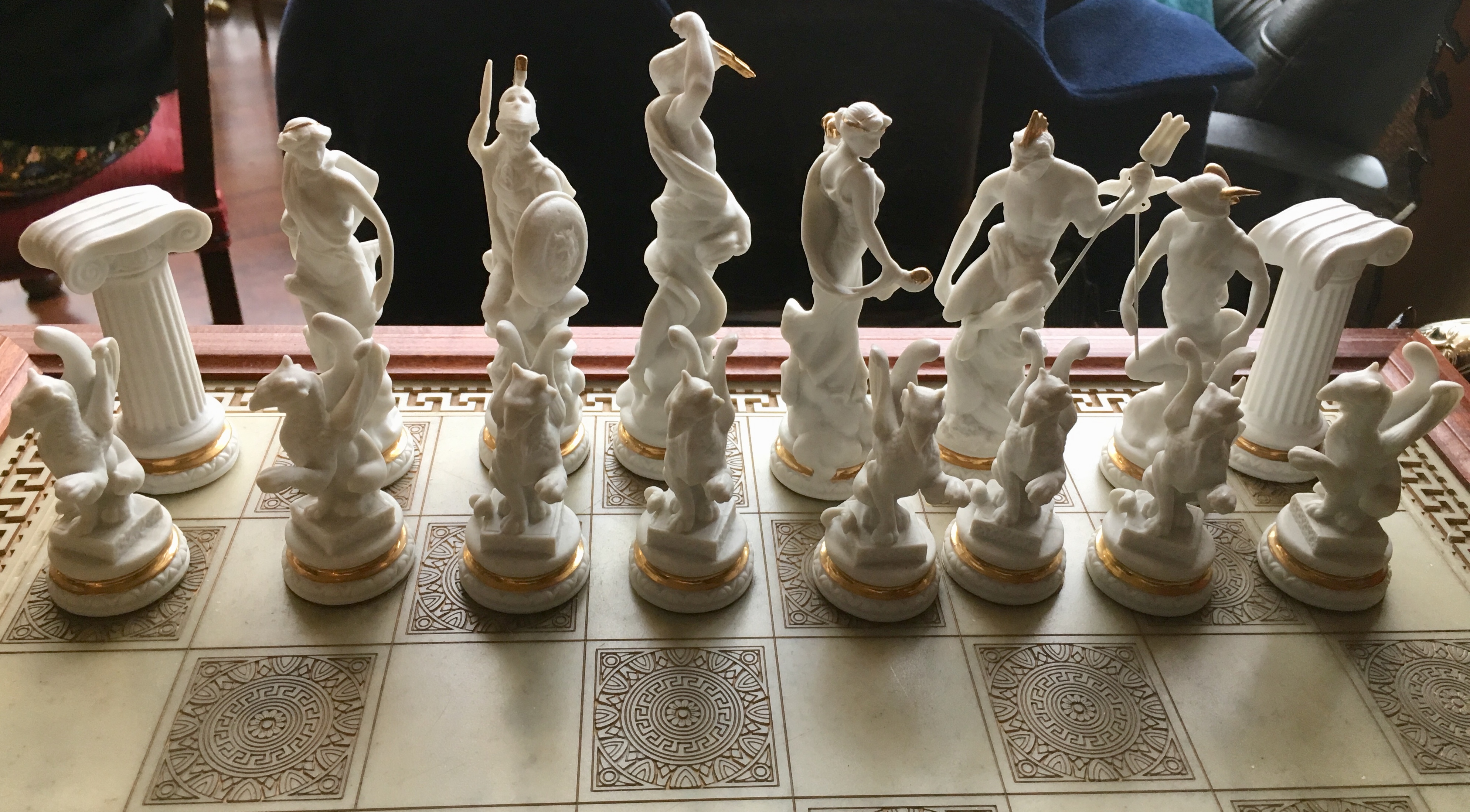On the chessboard, the Roman pantheon is a copy of the Greek gods. But what was it like in ancient times? How did the Greeks and Romans deal with their many gods?
The Chessmen Museum displays the Chess Game of the Gods, an impressive chess set and a true work of art, designed by American artist Stuart Mark Feldman. The sculpted chess pieces, up to 15 centimetres high, are made of pure white and black porcelain. The white pieces represent the Greek gods, with of course Zeus as King and the goddess of love Aphrodite as Queen. The goddess of wisdom Athena is the Queen´s Bishop, and Hermes, god of the travellers, represents the Knight. It is a bit confusing that Zeus has got his own Bishop and Knight: Poseidon and Artemis. Then there is the Rook, shaped like the iconic Ionic column. The Pawns are griffins.
On the black side we find the Romans and, as expected, their equivalents of the Greek gods. Jupiter and Venus are the King and Queen. Neptune and Diana are the Bishop and Knight on the King’s side and Minerva and Mercury are the Bishop and Knight next to the Queen. On the black side we also find an iconic column functioning as the Rook, namely the Corinthian one. Although this column originally belonged to the classical Greek architectural school, it was particularly popular in Roman times. Last but not least, for the Pawn, Feldman chose the famous war eagle which the Roman legions carried along with them when they set out for war. Let the battle commence…
Fusion gods
The Classical gods are not only widely represented on the chessboard but were also part of people´s daily lives in ancient times. The many religious festivals and rituals set the calendar and there were temples and shrines everywhere, both in the cities and the countryside. Religion in antiquity consisted of an almost infinite variety of religious gods with the accompanying sacrifices and other kinds of worship, with the Greeks and Romans mutually influencing each other.
In the third century BC, the Greeks had lost their political independence to the Romans, but the cross-pollination between the two religions had been going on for a while. Most Roman gods are based on the Greek ones, but that does not mean they were exactly the same or that all of them had the same functions. The rituals surrounding worship could also vary greatly and important Greek gods could be less popular with the Romans and vice versa. For example, war god Mars was a lot higher in the Roman hierarchy than Ares was in that of the Greeks.
The classical pantheon was open to gods from other cultures, and both the Greek and Roman divine realms were strongly influenced by religions from surrounding areas. The Romans in particular were very practical: they gave the gods from conquered territories an extra Latin name and incorporated them into their own world of gods that way. They would look at the most common similarities between the local and the Roman god. In Gaul, for example, the Celts worshipped the god Grannus, who was associated with healing sources. The Romans renamed this god Apollo Grannus. This does not mean that Apollo and Apollo Grannus were one and the same god. The ways in which people worshipped or portrayed these types of fusion gods could vary greatly by area.
Interpretation of the gods
Gods were everywhere and atheism in the modern sense of the word did not exist. The Greek word atheos did not traditionally mean that you didn´t believe in gods, it meant you thought that the gods had abandoned you. This was equal to being a godless and very bad person. Only from the second half of the fifth century BC did the term become fashionable for people who were too little or not at all dedicated to the gods. This often involved an accusation in legal suits.
The ancient Greek philosopher Epicurus, for example, was accused of atheism at the end of the fourth century BC. He denied the allegations and argued that gods definitely existed, but that they were not concerned at all with the people on earth. So there was no point in worshipping them really or, even worse, being afraid of them. But it was precisely this attitude that had got himself and his followers in trouble. That is why the epicureans did participate in religious rituals and festivals: it was just to keep the authorities happy.
Epicurus was not the only philosopher who questioned the traditional way of living with the gods. Over the centuries, various philosophical movements developed with critical views about whether or not to believe in the gods or in anything at all. These views went hand in hand with lively substantive debates about who or what the gods were and how they could best be dealt with.
Despite criticism of the gods or religious rituals, religion did play an important role in philosophy. Mythological stories by ancient poets, such as those written by Homer, were not labelled as false but interpreted in a different manner. According to the philosophers, in these myths the gods had a personality that was too human, with all their jealousy, thirst for revenge and vanity. They believed the poet had not meant all of that so literally. There was a deeper truth behind these traits that the philosophers had to reveal…
Vengeful and vain or not, the chess pieces of the classical Gods set are majestic. Come and have a look at them soon at the Chessmen Museum!





You must be logged in to post a comment.